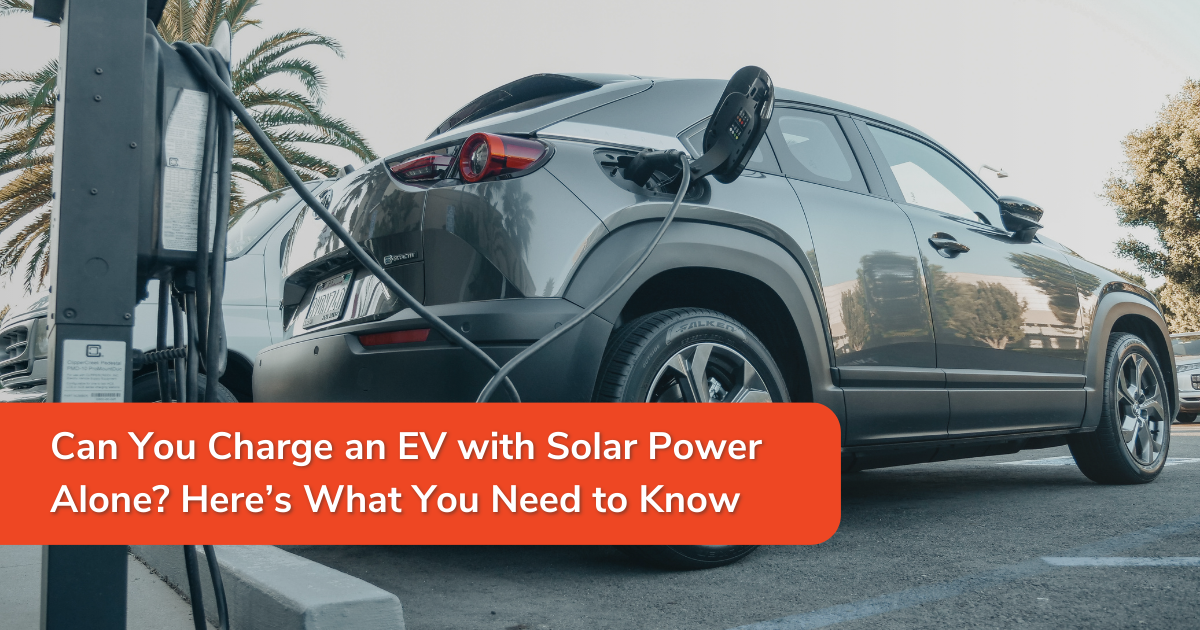Can You Charge an EV with Solar Power Alone? Here’s What You Need to Know

With the rise of electric vehicles (EVs) and increasing interest in renewable energy, many homeowners wonder whether they can rely entirely on solar power to charge their EVs. The short answer is yes—charging an EV with solar panels alone is possible. However, factors like solar system size, battery storage, and energy consumption patterns play a crucial role in determining feasibility. In this guide, we explore how you can charge your EV with solar power and what you need to make it work efficiently.
How Solar Charging Works for EVs?
Solar panels generate electricity from sunlight, which can either be used immediately, stored in a home battery, or fed into the grid. To charge an EV using solar power alone, you need to ensure that your solar system produces enough electricity during the day to meet both your household and vehicle charging needs. This often requires a system with adequate capacity, ideally paired with battery storage to allow charging at night or on cloudy days.
Key Factors to Consider
Solar System Size and Energy Production
The size of your solar panel system determines how much electricity you can generate. A standard EV requires around 15-20 kWh for a full charge, depending on the vehicle's battery size and efficiency. To cover both home energy use and EV charging, an average household might need a solar system between 6 kW and 10 kW, though this varies based on location, sunlight exposure, and daily energy consumption.Battery Storage for Round-the-Clock Charging
If you want to charge your EV at night, a home battery, such as the Tesla Powerwall 3, SolarEdge Battery, or Sungrow SBR, is essential. Batteries store excess solar energy during the day, allowing you to charge your EV when the sun isn’t shining. This maximises your solar usage and reduces reliance on the grid, helping you save on energy costs.Smart Charging and Energy Management
Smart EV chargers, such as those compatible with solar systems, can optimise charging by prioritising solar energy use. Features like dynamic load balancing ensure that your EV charges when solar production is highest, reducing grid dependency. Some advanced systems even allow scheduling to align charging times with peak solar generation hours, further improving efficiency.
Can Solar Power Alone Meet Your EV Charging Needs?
For some homeowners, a well-sized solar system with battery storage can provide sufficient power for daily EV charging. However, those with high energy consumption or living in areas with limited sunlight may still need occasional grid support. The effectiveness of solar-only EV charging depends on several factors:
-
Daily driving habits: If you drive long distances daily, your EV may require more energy than your solar panels can generate.
-
Weather conditions: Cloudy days and seasonal variations can impact solar production, making backup energy sources necessary.
-
Charging speed requirements: A Level 2 home EV charger requires more power than a standard wall outlet, influencing the feasibility of solar-only charging.
Maximising Solar for EV Charging
To make the most of your solar power for EV charging, consider upgrading to a high-efficiency solar system, investing in a home battery, and using a smart EV charger that integrates with solar energy management. Additionally, participating in a Virtual Power Plant (VPP) program can allow you to sell excess stored energy back to the grid, further offsetting costs and enhancing financial returns.
Conclusion
Charging an EV with solar power alone is achievable with the right setup. A properly sized solar system, battery storage, and smart energy management tools can help you maximise renewable energy use while reducing reliance on the grid. If you're considering making the switch, Smart Energy Answers can help design a tailored solar and EV charging solution to suit your needs. Get in touch today to start your journey toward energy independence!
%20(1).png?width=265&height=96&name=www.smartenergyanswers.com.auhs-fshubfsSmart%20Energy%20Answers%20Logo%20(HIRES)%20(1).png)

.png?width=514&height=121&name=Tesla%20Powerwall%203%20(new).png)







